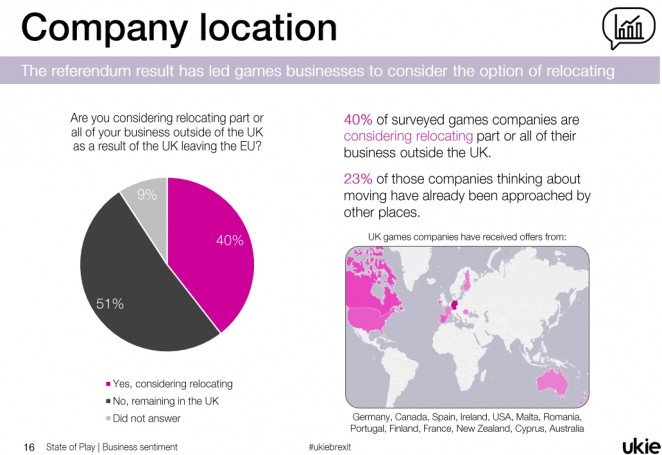Whilst Teresa May attempts to frantically backpedal expectation and one half of the UK prepares to devour the other half in a divisive move of unprecedented (at least in terms of sheer scale) madness, the video game industry in the UK is quietly planning its escape. At least according to the industry trade body, Ukie, which stated this morning that 57% of games companies employ workers from the EU that make up at least a third of their workforce, and many (roughly two fifths of the entire industry) are considering relocating elsewhere in Europe in the wake of Brexit. The major concern, of course, is the potential loss of international talent from EU countries, and this is apparently enough to make many companies (40%) seriously consider upping sticks and leaving the UK either partly or entirely.
A whopping 98% of those surveyed believe that EU nationals who are skilled enough should be given the right to work in the UK after Brexit, but, given the uncertainty surrounding the triggering of Article 50 this week, companies are simply not prepared to put up with the potential barriers that will make it difficult for EU workers to live and work in the UK. According to Ukie’s latest market valuation, the UK is the sixth largest games market in the world in terms of consumer revenues. Consumer spend in 2016 reached £4.33 billion, up 1.2% from the previous year. The country boasts more than 2,000 games companies, with 12,100 full-time employees. So, simply put, this would be a devastating blow. Just one of many that will undoubtedly continue to land as we struggle to weasel our way out of the EU, and the single market in kind.

It would be easy, of course, to level blame at the industry for abandoning a sinking ship, but when you examine the facts, you can't really blame them. To add insult to injury, leaving the EU may also leave UK companies unable to access funding from European programmes such as Creative Europe, which has funded studios such as the multi-Bafta winning The Chinese Room (creators of acclaimed 'walking simulators' “Dear Esther” and “Everybody’s Gone to the Rapture”). Chinese Room studio head, Dan Pinchbeck, said: “We should be doing everything we can to call for continued inclusion in such programmes post-Brexit, or for our government to provide alternative support for our world-class media industry.”
The future of gaming retail is also uncertain, as about one third of market share comes from physical sales, which may be subject to tariffs when the UK leaves the EU. A spokesperson for games retailer Game, said: “We are aware of, and monitoring closely, potential future changes including the possible impact of imposing tariffs on physical products and it is important to us that the UK retains the ease of trade that exists today.”
Ukie are not giving up the ghost just yet though. Since the triggering of article 50, the body has reinforced its resolve to ensure the industry gets the best possible deal. CEO Dr Jo Twist, said: “The Triggering of Article 50 signals the beginning of the end of the uncertainty we’ve all been facing since the Referendum last June. Ukie will continue to work with government across departments to ensure the industry’s needs are met, particularly around global talent, data and investment in homegrown innovation and creativity.” Dr Twist doesn't sound particularly optimistic, but honestly, as with all things Brexit, it's very much a case of playing “let's wait and see.”

For many companies, however, it appears that blind faith and half-hearted optimism simply isn't good enough, and, according to Ukie, at least 23% of the companies survey surveyed have already received serious offers from other countries. So, could Brexit spell the end of the UK gaming industry as we know it? Looks like we'll all be playing “wait and see” together on that one.
Benjamin Hiorns is a freelance writer, struggling musician and lifelong gamer from Kidderminster in the UK.



